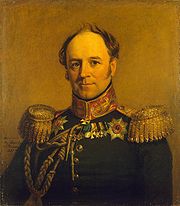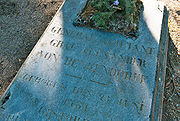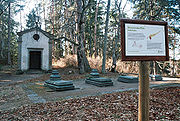
Alexander von Benckendorff
Encyclopedia

Russia
Russia or , officially known as both Russia and the Russian Federation , is a country in northern Eurasia. It is a federal semi-presidential republic, comprising 83 federal subjects...
n Infantry General and statesman, Adjutant General
Adjutant general
An Adjutant General is a military chief administrative officer.-Imperial Russia:In Imperial Russia, the General-Adjutant was a Court officer, who was usually an army general. He served as a personal aide to the Tsar and hence was a member of the H. I. M. Retinue...
of the H. I. M. Retinue and a commander in the Patriotic War of 1812 best remembered for having established the Gendarmes
Special Corps of Gendarmes
The Special Corps of Gendarmes was the uniformed security police of the Russian Empire in the 19th and early 20th centuries. Its main responsibilities were law enforcement and state security....
in Russia.
Alexander von Benckendorff was born to a Baltic German family in Reval (now Tallinn, Estonia
Estonia
Estonia , officially the Republic of Estonia , is a state in the Baltic region of Northern Europe. It is bordered to the north by the Gulf of Finland, to the west by the Baltic Sea, to the south by Latvia , and to the east by Lake Peipsi and the Russian Federation . Across the Baltic Sea lies...
). His brother Konstantin von Benkendorff was a general and diplomat, and his sister Dorothea von Lieven was a socialite and political force famous at London
London
London is the capital city of :England and the :United Kingdom, the largest metropolitan area in the United Kingdom, and the largest urban zone in the European Union by most measures. Located on the River Thames, London has been a major settlement for two millennia, its history going back to its...
and Paris
Paris
Paris is the capital and largest city in France, situated on the river Seine, in northern France, at the heart of the Île-de-France region...
. During Napoleon's invasion of Russia, Beckendorff led the Velizh
Velizh
Velizh is a town and the administrative center of Velizhsky District of Smolensk Oblast, Russia, situated on the bank of the Western Dvina, from Smolensk. Population:...
offensive, taking prisoner three French generals as a result. When Moscow
Moscow
Moscow is the capital, the most populous city, and the most populous federal subject of Russia. The city is a major political, economic, cultural, scientific, religious, financial, educational, and transportation centre of Russia and the continent...
was liberated, he became the commander of its garrison. In the foreign campaigns, he defeated a French contingent at Tempelberg and was one of the first Russians to enter Berlin
Berlin
Berlin is the capital city of Germany and is one of the 16 states of Germany. With a population of 3.45 million people, Berlin is Germany's largest city. It is the second most populous city proper and the seventh most populous urban area in the European Union...
. He further distinguished himself at Leipzig
Battle of Leipzig
The Battle of Leipzig or Battle of the Nations, on 16–19 October 1813, was fought by the coalition armies of Russia, Prussia, Austria and Sweden against the French army of Napoleon. Napoleon's army also contained Polish and Italian troops as well as Germans from the Confederation of the Rhine...
and cleared the French of the Netherlands
Netherlands
The Netherlands is a constituent country of the Kingdom of the Netherlands, located mainly in North-West Europe and with several islands in the Caribbean. Mainland Netherlands borders the North Sea to the north and west, Belgium to the south, and Germany to the east, and shares maritime borders...
. After the Britons and Prussians arrived to succeed him, his unit proceeded to take Louvain
Leuven
Leuven is the capital of the province of Flemish Brabant in the Flemish Region, Belgium...
and Mechelen
Mechelen
Mechelen Footnote: Mechelen became known in English as 'Mechlin' from which the adjective 'Mechlinian' is derived...
, liberating 600 imprisoned Englishmen on the way.

Alexander I of Russia
Alexander I of Russia , served as Emperor of Russia from 23 March 1801 to 1 December 1825 and the first Russian King of Poland from 1815 to 1825. He was also the first Russian Grand Duke of Finland and Lithuania....
of the Decembrist clandestine organisations
Secret society
A secret society is a club or organization whose activities and inner functioning are concealed from non-members. The society may or may not attempt to conceal its existence. The term usually excludes covert groups, such as intelligence agencies or guerrilla insurgencies, which hide their...
, but the Tsar ignored his note. After the 1825 Decembrist Revolt
Decembrist revolt
The Decembrist revolt or the Decembrist uprising took place in Imperial Russia on 14 December , 1825. Russian army officers led about 3,000 soldiers in a protest against Nicholas I's assumption of the throne after his elder brother Constantine removed himself from the line of succession...
, he sat on the investigation committee and lobbied for the creation of the Corps of Gendarmes
Special Corps of Gendarmes
The Special Corps of Gendarmes was the uniformed security police of the Russian Empire in the 19th and early 20th centuries. Its main responsibilities were law enforcement and state security....
and the secret police
Secret police
Secret police are a police agency which operates in secrecy and beyond the law to protect the political power of an individual dictator or an authoritarian political regime....
of Third Section of His Imperial Majesty's Own Chancellery
His Imperial Majesty's Own Chancellery
His Imperial Majesty's Own Chancery or H.I.M. Own Chancery began as personal chancery of Pavel I and grew into a kind of regent's office, run by Count Arakcheyev from 1815 and until the death of Alexander I of Russia....
. He was the first Chief of Gendarmes and Executive Director of the Third Section (1826–1844). Under his management, the Third Section established a strict censorship
Censorship
thumb|[[Book burning]] following the [[1973 Chilean coup d'état|1973 coup]] that installed the [[Military government of Chile |Pinochet regime]] in Chile...
over literature and theater plays. He directed the bias in Russian historiography, having said that "Russia's past was admirable, its present is more than magnificent and as for its future — it is beyond anything that the boldest mind can imagine."
Yet by temperament, he was the very opposite of a proto-Dzerzhinsky or a proto-Beria
Lavrentiy Beria
Lavrentiy Pavlovich Beria was a Georgian Soviet politician and state security administrator, chief of the Soviet security and secret police apparatus under Joseph Stalin during World War II, and Deputy Premier in the postwar years ....
; he suffered from a bizarre tendency to forget his own name, and periodically had to be reminded of it by consulting his own visiting card. After the mid 1830s, his family seat was the Gothic Revival manor, Schloss Fall (now Keila-Joa
Keila-Joa
Keila-Joa is a small borough in Keila Parish, Harju County, northern Estonia. It has a population of 309 .-External links:*...
) near Tallinn.

Benckendorff's notes
In 2001, a Moscow publisher came out with Zapiski Zapiski Benkendorfa: 1812 God: Otechestvennaia Voina; 1813 God: Osvobozhdenie Niderlandov (Yaziki Slav'anskix Kul'Tur, Moscow, 2001). ISBN 5-7859-0228-1. (The title translates to Benkendorff's notes: 1812: The Patriotic war; 1813: Liberation of the Netherlands). This book reproduces two sections of Benckendorff's private notes which had previously not seen publication since 1903, along with commentary, some associated regimental history and letters.According to the book cited above, Benckendorff kept personal notes/diaries throughout his life. One additional source for his notes, in this case from the late 1830s, can be found in volume 91 of the journal Istoricheskij Vestnik (alternate spelling: Istoricheskii Vestnik) for 1903.
Further reading
- Ronald Hingley, The Russian Secret Police: Muscovite, Imperial, and Soviet Political Security Operations (Simon & Schuster, New York, 1970). ISBN 0-671-20886-1
- R. J. Stove, The Unsleeping Eye: Secret Police and Their Victims (Encounter Books, San Francisco, 2003). ISBN 1-893554-66-X
- Judith Lissauer Cromwell, "Dorothea Lieven: A Russian Princess in London and Paris" (McFarland and Co., 2007) ISBN 0-7864-2651-9
External links
Baltic nobility genealogy handbook Alexander von Benckendorff- http://www.mois.ee/english/harju/keilajoa.shtml – overview of Keila-Joa (in German: Schloss Fall) manor in Estonian Manors Portal

